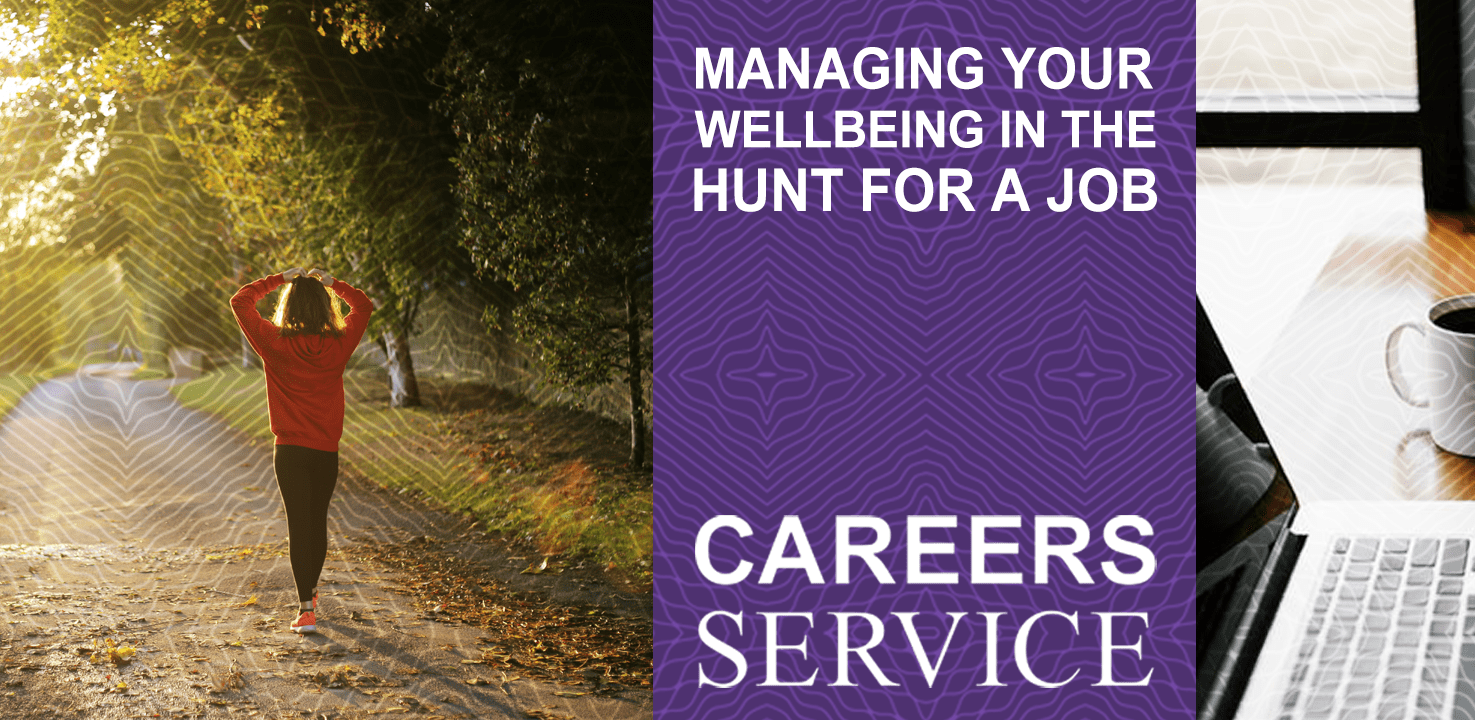Searching for a job is a stressful experience for most people. This blog aims to help reassure anyone on their search and give them tools and advice to look after their wellbeing during it.
When asked about their biggest challenges over the past 12 months, 55% of people said they struggled with their mental health and feeling motivated about their studies or job/job search.
Prospects Early Careers Survey 2022
It can sometimes feel as though everyone else has a job lined up and you’re the only one struggling to find one.
Recognise that a level of anxiety about the hunt for a job is perfectly normal – be kind to yourself. Applying for jobs and going for interviews isn’t anyone’s favourite thing and everyone finds it stressful. However, sometimes it can feel overwhelming, if you’re one of the 55% the tips, advice and resources below aim to help you manage how you feel about that stress and maintain your wellbeing along the way.
Make a realistic plan and stick to it
Look at the process for finding a job that you’ll enjoy.
Plan to take achievable steps and block out a little time each week to focus on just one step. Use this focus time to research careers/organisations, contact alumni, draft a CV or do some self-reflection about your skills and strengths.
Tip: Don’t try to do it all at once, pacing the job search over time helps keep the momentum and motivation going without being overwhelmed and frustrated.
Resources: How to pick a career, CV Guides (undergrads/masters or PhD’s/Postdocs, Self-Reflection Toolkits, Alumni Careers Connect
Get something constructive from rejection
I found rejections from employers hard to take
Try not to take rejections personally. For many people, job application rejections (or worse not hearing back at all) is the first time they’ve not achieved something they’ve worked for. Sometimes it really is just statistics – many great people apply for every job and it can only be offered to one of them.
Learn from disappointment. If you are getting repeated rejections, try to get feedback or reflect on your applications/interview to understand areas that you can improve on for next time and turn rejection from a negative experience into a constructive one.
Tip: Write down interview questions as soon as you come out, together with a couple of notes about how you answered, even a couple of hours later you’ll probably have forgotten some of it.
Resource: Shortlist.Me (online interview practice), Careers Service resources on applications and interviews
Avoid comparison
I felt that my friends were doing better than me
The early career job hunt is an extremely varied place. Comparing to others can be unhelpful, especially if they’re going for jobs in a different career area where the recruitment timetable is very different from the one you’re going for.
Tip: Ask friends who already have a job lined up for their support in your job applications.
I found social media updates of my peers’ activities overwhelming
Think of job hunt social media as a photoshopped version of the truth. Even those with the best looking CV’s don’t share their list of rejections.
Tip: If social media gets overwhelming, take a break from it, or switch to following the organisations you’re interested in instead. You might pick up some insights to improve future applications.
“Have you sorted out what you’re doing after graduation?”
Well-meaning friends and relations can add unwanted pressure, by asking questions, especially if you’re already feeling anxious. Possible answers that say you’re being proactive or taking a deliberate break after graduation can ease that pressure:
“I’m researching options that are a good fit for me and using the Careers Service resources to narrow them down at the moment.”
“I’ve decided what I want to do but the applications for that type of job don’t happen until later in the year”
“This year is already very intense so I’ve taken the decision to apply for jobs after exams when I’ll have the time and energy to really focus on it properly.”
Tip: Prepare an answer for when you’re put on the spot that says you’re being proactive about your job hunt, not procrastinating but don’t expect anything more yet.
Be kind to yourself, both body and mind
Prioritising a healthy diet, exercise and sleep pattern will have a positive impact on your wellbeing and help you combat stress and anxiety.
Better to apply to a select few jobs well than stay up at night applying to dozens in the hope that one might work!
Careers Service resources for Mental Health and Wellbeing:
Mental Health support and advice outside University:

